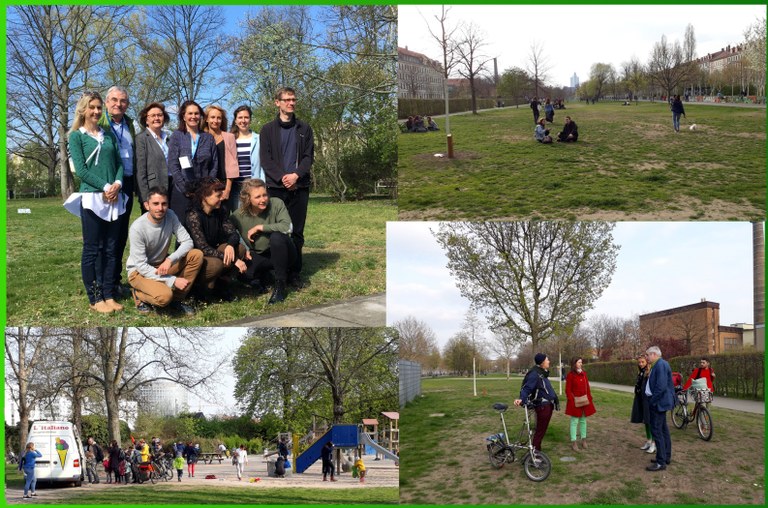Urban Ecosystems, Health and Environmental Justice
Interactions and impacts of environment and health in cities

Topic
-
Cities in the focus of global change
-
In times of increasing urbanization and climate change the topic of urban nature is central for healthy, more resilient and sustainable urban planning, not the least for vulnerable population groups like children, the elderly or socioeconomically deprived groups that have often less access to urban green and blue spaces but are more sensitive to the health issues associated with urbanization, particularly in combination with climate change.
-

-
Thus, more elaborated research is needed that take into account multiple context factors including multi-method (spatial) approaches to show impacts of global challenges on urban vegetation and vice verso on health outcomes of vulnerable urban population. As many research studies already showed, socioeconomic confounders play a major role in health outcomes and may override environmental factors. See our GreenEquityHEALTH-Project.
News
We are happy that our GreenEquityHEALTH group lead Nadja Kabischwas named a Highly Cited Researcher 2021 for significant influence in Social Sciences.

Here find our new GreenEquityHEALTH video "Leipzig - A growing city responds to global changes".
Urban green spaces and street trees regulate the urban microclimate. In cooperation with the Helmholtz Centre for Environmental Research and the Leibniz Institute for Tropospheric Research, a new methodological paper with this topic was published here.
The proportion of people suffering from pollen allergies is rising steadily, especially in densely populated areas. Against this background, we would like to find out how the people of Leipzig deal with pollen pollution and what role visits to parks play in this. To this end, a survey on pollen or allergy exposure and the role of green spaces in Leipzig was conducted as part of a study together with the German Center for Integrative Biodiversity Research, the Helmholtz Center for Environmental Research and the Leipzig Interdisciplinary Center for Allergology at Leipzig University Hospital. Further information on the PolDiv project can be found here.
Nadja will give a keynote lecture at the ReNature 2nd: "Interdisciplinary Training School - Planning Nature-based Solutions in Cities". A program overview is available here.
New research paper from GreenEquityHEALTH-Team: "Physiological and psychological effects of visits to different urban green and street environments in older people: A field experiment in a dense inner-city area".
Nadja is on the Clarivate Web of Science List for Highly Cited Researchers 2020 
- Nadja Kabisch is speaker on the Conference Urban Transitions - Integrating urban and transport planning, environment and health for healthier urban living on November 10 - 12, 2020 in Barcelona.
- Nadja Kabisch and Roland Kraemer take part at the 3nd World Conference of the Society for Urban Ecology - Cities as social ecological systems on July 6 - 8, 2020 in Poznan.
- Nadja Kabisch and Roland Kraemer take part at the IfL Forschungswerkstatt #6 “Mixed Methods in Spatial Science” on 27./28. February 2020 in Leipzig.
- At this years DGPPN congress Nadja Kabisch (together with Prof. Mazda Adli, Charité Berlin) leads the symposium "Psychische Gesundheit in der Stadt: Kriterien für eine resilienzfördernde Stadtplanung". She gives a lecture on: "Interactions and impacts of environment and health in cities".
Project news
As research has already shown, socioeconomic confounders play a major role in health outcomes and may override environmental factors. This aspect warrants the inclusion of an environmental justice perspective in future studies on the effect of urban green and blue spaces on public health in the context of urbanisation and climate change.

Our first GreenEquityHEALTH expert workshop took place 9-10th April 2019 at the Helmholtz Centre for Environmental Research-UFZ in Leipzig. In Leipzig the first field campaign with heat measurements and observations took place in summer 2018 with two interesting case study sites. During the workshop, results from the field campaign 2018 were presented and discussed. The selected green spaces as our case study cites - Friedenspark and Lene-Voigt-Park - were visited in an guided excursions during the workshop. The Friedenspark is an old grown historical park and the Lene-Voigt-Park quiet near a newly developed fancy regenerated former railway brownfield that is now a well acknowledged city park. Workshop participants, in particular the Advisory Board Members from the GreenEquityHEALTH project - Matilda van den Bosch, Chantal van Ham, Angela Lausch, Jan Bumberger, Dagmar Haase and Herbert Lohner - gave advise in extensive discussions on how to improve results presentation and construct the second field campaign planned for summer 2019